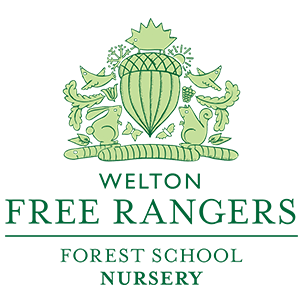Last week’s Forest School activity was focused around language and imagination. Our setting for this activity was the inside of the willow dome, a natural ‘room’ or enclosure, a cosy space perfect for storytelling. Following the previous week’s Forest School sessions that used pots and pans for role play cooking by the fire pit, we used a large pan and mixing spoon, and a bag of objects.
Firstly, the children had to decide what we were making, will it be a Potion? Soup? A Story? The children were then invited to select an object from a bag to add to the pan. The bag consisted of a combination of natural or found objects, such as a pinecone, a stick, pine needles etc, and small world resources such as a wizard, a fairy, a tractor. Taking turns was important to make sure that everyone played a part in making our creation. They were asked to tell us something about what they had chosen. Some children used appropriate language to tell us what their object was or described the physical properties, or what it is used for. Some children displayed brilliant imaginations when selecting their props to add. Spoons became bows and arrows that belonged to a giant, a fairy lived by our pond, an egg came from a pink bird that was flying in the sky over us and pine needles were chopsticks.
There was imaginative use of numbers in some of our groups as the children pretended one item represented many, for example by adding 1 pine cone that actually meant that 68 pine cones were added, 1 carrot represented 100 carrots and 1 egg represented 16 ½ eggs. Mathematics and literacy were present during one session where a child introduced the idea that we were making a potion which would make us a broom, as in the ‘Room on the Broom’ story. The magic words were “iggity ziggety zaggity zoom” just like in the story. We counted the number of people in our group to decide how many seats our broom would need, then at the end of the activity we pretended to fly together on our broom back to the Den.
Another group decided to make a ‘soup’ with their objects, we made an ingredients list as each item was added and we pretended to taste the soup when it was ready. This displayed further imagination such as “it tastes like a lolly”, “oh, we didn’t put any cheese or ham in it”, “mmm chocolate burnie!”, (it tastes like) “berries” and of course “poo!”
After the activity, the children had time to explore the space around the willow dome and pond area, or some children chose to remain in the willow dome to create more potions. Whichever they selected it was apparent that these children continued to display their imaginations. A small group broke off and went on a ‘Bear Hunt’, following another one of our favourite stories. Another child pointed out areas of stinging nettles, which was actually her vegetable patch, she then named each of the vegetables that she had grown in her imaginary garden. Some children role played ‘schools’ inside the willow dome and acted out being the teacher. Pretend play is so important for young children to help them to make sense of the world around them and pretend play is also lots of fun!







